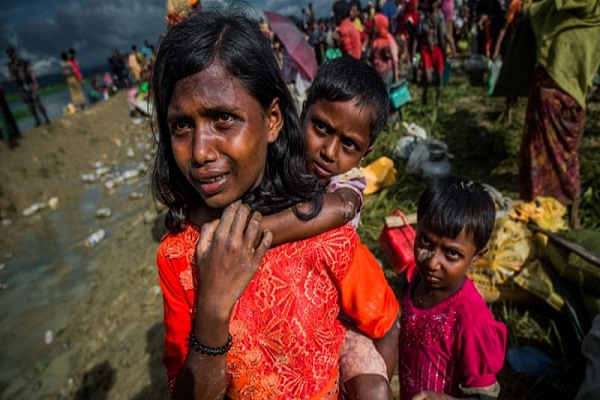Myanmar, Bangladesh ink Rohingya Muslim Return Deal

Rights groups have accused the military in mostly Buddhist Myanmar of carrying out mass rape and other atrocities during a counter-insurgency operation launched in late August in retaliation for attacks by militants in Rakhine State.
On Wednesday, the United States said the military operation that drove 620,000 Rohingya to seek sanctuary in neighboring, largely Muslim Bangladesh, amounted to "ethnic cleansing”, echoing an accusation first leveled by top U.N. officials in the early days of the humanitarian crisis.
Myanmar is seeking to ease international pressure by striking an initial agreement on returns, while Dhaka wants to ensure overstretched refugee camps that have mushroomed in the Cox’s Bazar region don’t become permanent.
The return of the refugees should start in two months, the pact says, according to Reuters. A joint working group will be set up in three weeks and a specific bilateral arrangement for repatriation "will be concluded in a speedy manner,” the Bangladesh foreign affairs ministry said in a statement.
"We are ready to take them back as soon as possible after Bangladesh sends the forms back to us,” Myint Kyaing, a permanent secretary at Myanmar’s ministry of labor, immigration and population, told Reuters, referring to forms the Rohingya must complete with personal details before repatriation.
The signing took place after a meeting between Myanmar’s civilian leader Aung San Suu Kyi and Bangladesh foreign minister Abul Hassan Mahmood Ali in Naypyitaw.
In its statement, Myanmar said the deal was based on the 1992-1993 repatriation pact between the two countries that followed a previous spasm of violence in Myanmar.
Although Western countries and the world Muslim body, the Organization for Islamic Cooperation, portrayed the matter as an international issue, Myanmar said it was resolved via two-way talks based on "friendly and good neighborly relations”.
"Issues that emerge between neighboring countries must be resolved amicably through bilateral negotiations,” Suu Kyi’s office said.
On the basis of the 1992-1993 agreement, Myanmar would accept those who could present identity documents issued to the Rohingya by governments in the past, Myint Kyaing said.
Acceptable identity documents include the currently distributed national verification cards, the now-withdrawn "white cards”, and receipts the Rohingya received for the return of "white cards”, he said.
The refugees have to provide names of family members, previous addresses in Myanmar, birthdates and a statement of voluntary return in the forms they fill out, he added.
Diplomats have said key deal elements will be the criteria of return and the participation of the United Nations refugee agency, UNHCR.
Other important points include safeguards for the Rohingya against further violence, a path to resolving their legal status and whether they would be allowed to return to their own homes and farms.
Myint Kyaing declined to elaborate on those points.
Speaking at a military event in Dhaka, Bangladesh Prime Minister Sheikh Hasina said she was calling on Myanmar "to start taking back soon their nationals from Bangladesh”.
However, there was little enthusiasm for the deal among Rohingya refugees in the camps in Bangladesh’s Cox’s Bazar area near the Myanmar border.
"We will go back to our country if our demands are met,” said one of them, Salimullah, who arrived in Bangladesh 15 days ago. "Our demands are that we are given citizenship. They also have to give us back our land,” he said.
Suu Kyi, whose stature as a Nobel peace prize winner was tarnished by the crisis, has said repatriation of the largely stateless Muslim minority would be based on residency and that it will be "safe and voluntary”.
But her civilian administration, which is less than two years old, has to share power with the military that ruled Myanmar for decades, and the generals have appeared less enthusiastic about the prospect of Rohingya returning.
On a visit to Beijing on Wednesday, Myanmar’s commander in chief, Senior General Min Aung Hlaing, was told by a senior Chinese general that China wanted stronger ties with Myanmar’s military.
Humanitarian workers said they were particularly concerned about a statement by Min Aung Hlaing last week.
"The situation must be acceptable for both local Rakhine ethnic people and Bengalis, and emphasis must be placed on wish of local Rakhine ethnic people who are real Myanmar citizens,” Min Aung Hlaing said.
His use of the term Bengali for the Rohingya implies they are from Bangladesh, and Buddhists in Rakhine are largely opposed to their presence.
Min Aung Hlaing, over whom Suu Kyi has no control, also said the returnees would be "scrutinized and re-accepted under the 1982 Citizenship Law and the 1992 Myanmar-Bangladesh bilateral agreement”.
The 1982 law, passed during the junta’s long rule, ties Myanmar citizenship to membership of recognized ethnic groups, an official list that excludes the Rohingya.
Senior UN officials based in Myanmar said they feared that security personnel in key positions may not cooperate over the return of Rohingya.



